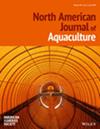实验室培育的长鳍鱼在圈养的第一年就产生了后代
IF 1.3
4区 农林科学
Q3 FISHERIES
引用次数: 0
摘要
长鳍鱼是北美西海岸特有的一种濒危洄游饲料鱼。尤其是旧金山河口最南端的独特种群,在过去的几十年里,它们的数量急剧下降。有效保护长鳍鱼可能需要多种策略,圈养繁殖和饲养可能成为增加种群规模和保持遗传多样性的必要条件。直到最近,公司才投入大量资金,为朗芬冶炼厂开发文化项目。在这里,我们报告了第一次成功饲养实验室繁殖的长鳍鱼(F1)到成熟(1岁以上),随后产卵和生产第二代长鳍鱼(F2),完全在人工饲养中。我们还描述了在成熟F1亲鱼的复杂生命周期中利用的培养条件。本文章由计算机程序翻译,如有差异,请以英文原文为准。
Laboratory-bred Longfin Smelt produced offspring in the first year in captivity
Longfin Smelt, Spirinchus thaleichthys, is an imperiled migratory forage fish that is endemic to the west coast of North America. The southernmost distinct population in the San Francisco Estuary, in particular, has experienced dramatic declines in abundance over the past few decades. Diverse strategies are likely needed for effective conservation of Longfin Smelt, with captive breeding and rearing likely to become essential for enhancing population size and preserving genetic diversity. Only recently have significant investments been made to develop a culture program for Longfin Smelt. Here, we report the first successful rearing of laboratory-bred (F1) Longfin Smelt to maturity (at age-1+), followed by the subsequent spawning and production of a second generation (F2) of Longfin Smelt, entirely within captivity. We also describe the culture conditions utilized throughout the complex life cycle of the mature F1 broodstock.
求助全文
通过发布文献求助,成功后即可免费获取论文全文。
去求助
来源期刊
CiteScore
2.50
自引率
0.00%
发文量
46
审稿时长
18-36 weeks
期刊介绍:
The North American Journal of Aquaculture publishes papers on new research and practical experience in all areas of intensive and extensive fish culture. Topics include broodstock selection and spawning, nutrition and feeding, health and water quality, facilities and production technology, and the management of ponds, pens, and raceways.
The journal will consider papers dealing with ways to improve the husbandry of any aquatic species—marine or freshwater, vertebrate or invertebrate—raised for commercial, scientific, recreational, enhancement, or restoration purposes that may be of interest to practitioners in North America. Its scope includes both basic and applied science, but applied scientific endeavors—including practical experiences, descriptive studies, and other nontraditional, but pertinent works—are emphasized.

 求助内容:
求助内容: 应助结果提醒方式:
应助结果提醒方式:


